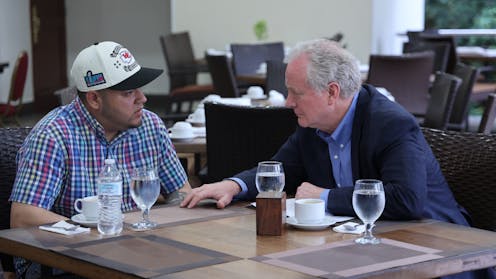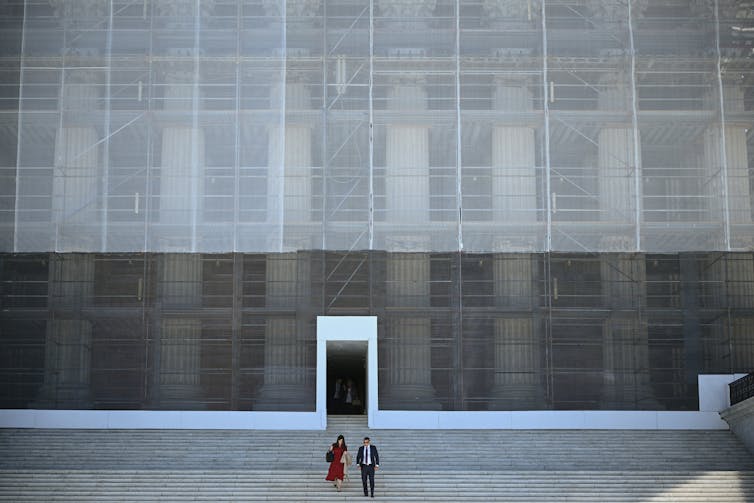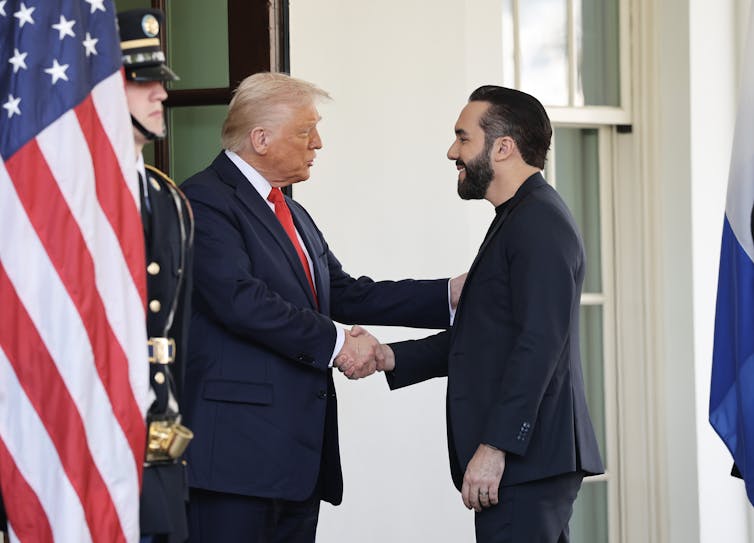
Trump administration officials have repeatedly claimed that judges who order the administration to take action to bring deported Venezuelans back from the El Salvador prison where the U.S. sent them are meddling in the conduct of foreign policy.
“The foreign policy of the United States is conducted by President Donald J. Trump − not by a court − and no court in the United States has a right to conduct the foreign policy of the United States,” Secretary of State Marco Rubio said on April 14.
His comments refer to cases including that of Kilmar Abrego Garcia, a 29-year-old Salvadoran man who was deported to El Salvador on March 15, 2025, without any due process. The Trump administration says it will not bring him back to the U.S., despite a Supreme Court order to facilitate his return.
A reporter on April 30 asked Rubio about whether he has been in touch with El Salvador regarding Abrego Garcia’s potential release from a maximum security prison there.
“Well I would never tell you that and you know who else I would never tell? A judge. Because the conduct of our foreign policy belongs to the president,” Rubio said.
Rubio made a similar point on April 14, posting on X, “No court in the United States has a right to conduct the foreign policy of the United States. It’s that simple. End of story.”
The legal cases of Abrego Garcia and other noncitizens deported to El Salvador are far from simple. Chimène Keitner, a scholar of international law and civil litigation, answers a few key questions about the power that U.S. judges actually have in these wrongful deportation cases.

Are these cases really about foreign policy or something else?
These wrongful deportation cases aren’t primarily about foreign policy, despite what Trump officials have said − they’re about the protection of individual rights, including the right to due process.
The Trump administration is arguing that courts cannot grant relief to individuals challenging their deportation and detention if those individuals are sent to another country and imprisoned there. Under that argument, even a wrongfully detained and deported U.S. citizen would be out of luck. That can’t, in my understanding, be right.
In Reid v. Covert, a foundational case from 1957, the Supreme Court made clear that the government cannot deprive U.S. citizens of due process by entering into an agreement with a foreign country.
Now, noncitizens are being detained in El Salvador under arrangements concluded between Rubio and Salvadoran President Nayib Bukele in February 2025.
So far, the relevant agreements have not been disclosed to Congress, arguably in violation of U.S. law. They also have not been disclosed to courts that have sought answers about relevant details.
Following an April trip to El Salvador, U.S. Sen. Chris Van Hollen, a Democrat from Maryland, said that the U.S. will pay El Salvador $15 million to imprison the deported noncitizens − and that El Salvador is imprisoning these men only because the U.S. is paying for it.
What are other important elements to understand about these cases?
The Trump administration is arguing that a judge or the Supreme Court cannot order it to return noncitizens to the U.S., because detention operations in El Salvador, a sovereign country, are beyond the reach of U.S. courts.
However, the U.S. decisions to arrest, detain and deport noncitizens to El Salvador, and to pay for their incarceration there with U.S. taxpayer dollars, are not foreign policy decisions that cannot be reviewed by any judge.
They are, I would argue, governmental deprivations of the individual right to due process.
A U.S. court does not have power over the government of El Salvador. However, it can order the U.S. government to request an individual’s return. The Supreme Court has ordered the government to “facilitate” the return of Abrego Garcia.
The government has argued that “facilitate” in this context simply requires removing domestic U.S. legal obstacles. However, given that Abrego Garcia is being detained in El Salvador, any effective remedy would require the U.S. government to request his return under the detention agreement between the two countries.
Another federal judge made this clear in an April order requiring the government to make a “good faith request” to El Salvador to release a different wrongfully deported 20-year-old.
Meanwhile, Trump has stated that his administration is exploring the idea of extending the El Salvador detention agreement to encompass U.S. citizens. Judges have already expressed concern that U.S. citizens, including children, are being removed from the country “with no meaningful process.”
These actions cannot be shielded from judicial review on the grounds that they involve foreign policy.

Could the Trump administration legitimately claim that judges cannot rule on its foreign policy decisions?
The Constitution gives foreign affairs powers to both the executive and legislative branches. Judges can’t conduct foreign policy. They can, however, decide cases that may affect foreign policy, especially when individual rights are at stake.
Another country’s involvement in a case doesn’t prevent U.S. courts from protecting individual rights.
Can these court orders to bring back wrongfully deported individuals be enforced?
The Trump administration is currently trying to portray judges as spreading “lawlessness” with these court orders, in the words of Deputy Chief of Staff Stephen Miller. But I would argue that the opposite is true. If the White House disagrees with an order by a district court or court of appeals, it can seek review by the Supreme Court. Meanwhile, it is obliged to obey lower court orders absent a stay, or pause, of their implementation.
Courts can do their part to reject claims that the executive branch is entitled to act without regard for legislative or judicial limits by issuing strongly worded orders and even holding officials in contempt. At the end of the day, however, only Congress is empowered to remove a president who refuses to comply with the law.
Chimene Keitner does not work for, consult, own shares in or receive funding from any company or organization that would benefit from this article, and has disclosed no relevant affiliations beyond their academic appointment.
This article was originally published on The Conversation. Read the original article.







